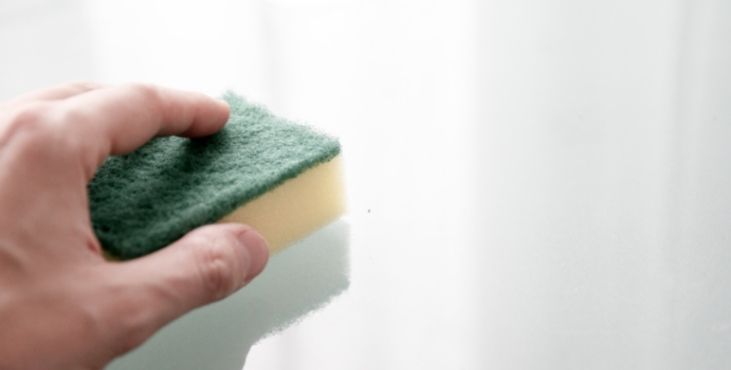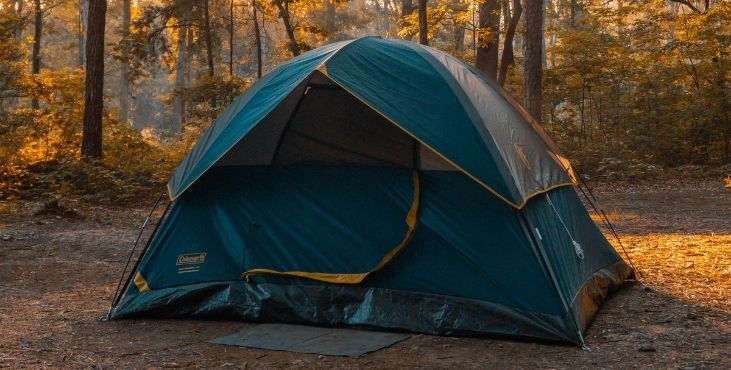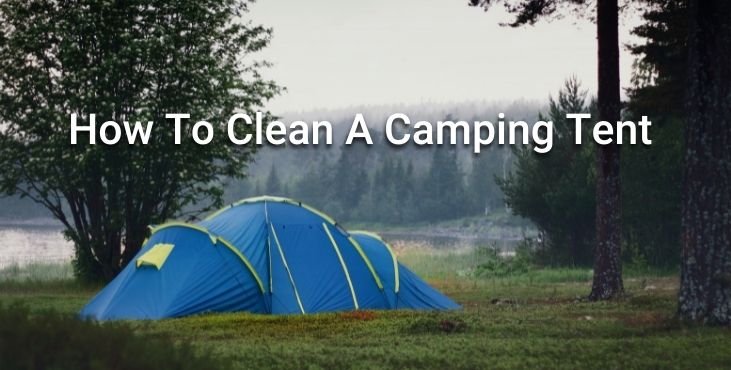To prolong the life of your tent it is important to wash and dry your tent before storing it away for Winter. It is also important to keep it clean after every use to slow down the process by which the tent loses its waterproof coating. Dirt, mud, oils and debris get ground into the fabric of the tent and over time this degrades the waterproofing ability of the fabric.
Contents
How To Keep The Worst Dirt Away From Your Tent
There are a few tips that will help prevent your tent from becoming too mucky, so let’s start with those as prevention is always better than cure.
- Use A Tarp On The Ground
By placing a tarpaulin sheet on the ground and putting the tent’s groundsheet on top of that, you’ll prevent the groundsheet from getting too muddy. Which makes it easier to pack away at the end of your trip. - Remove Mud From Tent Pegs Before Packing Away
Using your fire bucket filled with water, and the brush from the dustpan & brush, make sure every tent peg is washed clean of mud before packing away. - Whenever Possible, Break Camp In Dry Conditions
We know there are times when you have to break camp in bad weather but, if at all possible choose a warm, bright, dry day to pack away your tent to prevent any unwanted moisture from staying on the tent to create mould.
Cleaning A Camping Tent
After spending time in the great outdoors, coming home with a dirty tent is to be expected. If you want your tent to last for a few seasons, you’ll need to clean it properly before packing it away. Always brush the inside of the tent before breaking camp to remove any unwanted guests like insects, mould spores, sharp twigs etc which can all damage the interior of the tent.
How To Clean Your Tent

The equipment needed to clean a tent doesn’t cost too much and a lot of it you’ll probably already own. You will need;
- Water
- Proprietary tent cleaner
- Bucket
- Bath
- Sponge
- Cloths
- Remove any loose dirt and debris
Using a stiff brush, your hand or a cloth, remove as much of the loose stuff as you can. - Clean any seriously stained areas
Inspect the tent for any damages and repair as necessary. If you find any seriously dirty areas or mould patches, spot clean them using some of the tent cleaner on a cloth. Be sure to only use a proprietary tent cleaner as any other detergent will be too harsh and remove the waterproof coating on the tent. - Soak the tent
Once you’ve spot cleaned the really bad bits, soak the whole tent in the bath full of water with the tent cleaner added. After soaking for around 20 to 30 minutes, swirl the tent around in the soapy water. - Rinse
Drain the soapy water away and replace with fresh, clean water and repeat until all of the soap suds have gone. - Dry thoroughly
After removing as much water as possible, set the tent up or hang it in a shady, cool area until it’s completely dry. Then store it away for next time.
How To Deal With Specific Cleaning Issues
Mould & Mildew
Mildew and mould can become a problem for some tents. If you have these issues, you can buy a proprietary cleaner specifically for these conditions. Use as per the product instructions carefully. Please be aware that using mildew removing cleaners for too long can affect the waterproof coating on your tent.
Pine Sap
Pine sap is another common tent problem. If your tent has areas of pine sap use mineral oil as a spot cleaner but don’t apply too much pressure. Hand wipes/sanitiser is also effective against pine sap. As is rubbing alcohol.
Dirty Tent Poles
If the tent poles are dirty, grimey or dusty, wipe them over with a damp cloth and then dry using a clean cloth.
Zipper
If your tent zipper is sticking, clean it using a soft toothbrush and then lubricate the zipper using a graphite pencil, WD 40, vaseline or candle wax.
Tips To Preserve The Life Of Your Tent

To keep your tent in tip top conditions for years to come always;
- Completely Dry Your Tent Before Storing
Be sure all moisture is removed before storing your tent away. - Store The Tent In A Cool, Dry Place
Don’t give mould spores a chance to survive. - When Breaking Camp Remove Middle Poles first
This spreads the load-weight evenly on the other poles to prevent damage. - Air Your Tent Before Packing Away
It’s good practise to air your tent to remove any moist air from the tent that can lead to mould and mildew. - Roll Your Tent – Don’t Stuff It
This puts less pressure on tent seams, coatings etc and will help your tent last longer.
If you do notice any damaged areas on your tent, replace or repair using approved tent accessories and parts. If you need to re-waterproof your tent this guide will help you.
Where To Store A Tent
Tents need to be completely moisture free before storage and they should be stored in dry, cool conditions. Unsuitable storage areas include basements and attics as these are subject to temperature fluctuations and often have damp issues too.
If a shed or a garage are your only option you’ll need to use a plastic watertight/airtight container. Tents should be stored flat to avoid any damage and never store anything on top of the tent.
How To Repair A Damaged Tent Fast
If you notice any small rips or tears in the tent or groundsheet you need to repair them immediately to prevent them getting any bigger and ruining your weekend’s camping.
Small Tears & Rips
These can temporarily be fixed using duct (gaffer) tape. For larger repairs you will need to invest in some self-adhesive tent patches. The easiest way to effect a temporary repair takes two people. One doing the repair and the other propping the area up from inside using a wooden chopping board or similar against the damaged area. This gives the repairer something solid and firm to push against which will create a flat repair that’s stuck firmly.
Broken Tent Pole
The best solution for a broken tent pole is to always carry spare poles in your car, for on the spot repairs try using duct tape to hold strong twigs around the broken sections of pole.
Useful spares for your tent include;
- Duct (Gaffer) Tape
- Spare Tent Poles
- Spare Tent Pegs
- Self-Adhesive Patches
- Spare Guy Lines
- Seam Sealant
- DWR Spray (waterproofing spray)
Before jumping to the conclusion that your tent has a leak, check it’s not just condensation first. You could do a whole lot of unnecessary repairs if you aren’t careful. Only ever use proprietary tent cleaning/repairing equipment to avoid any damage.

Leave a Reply